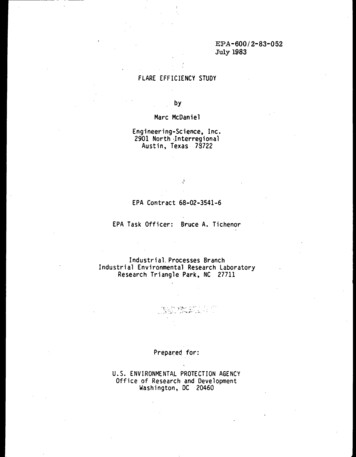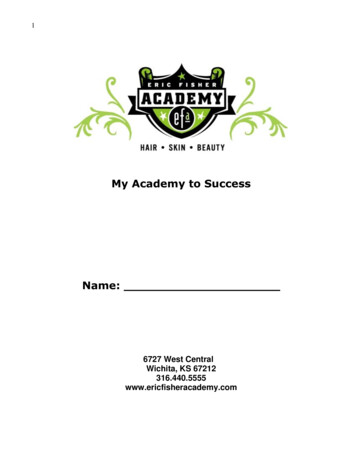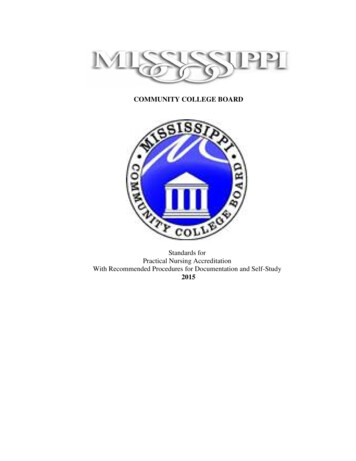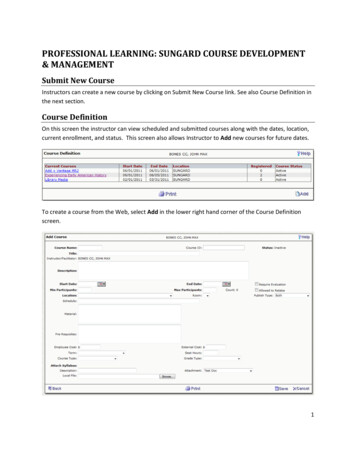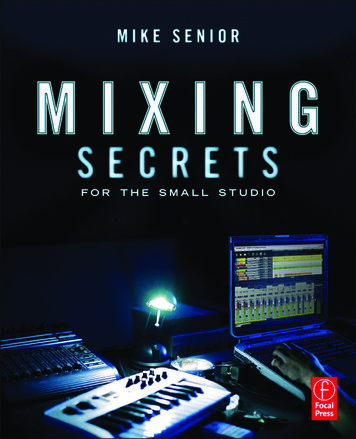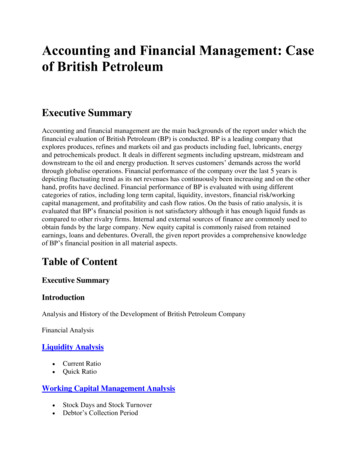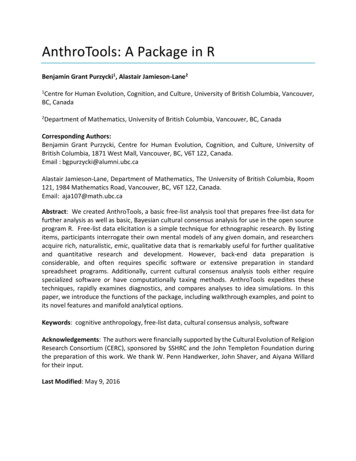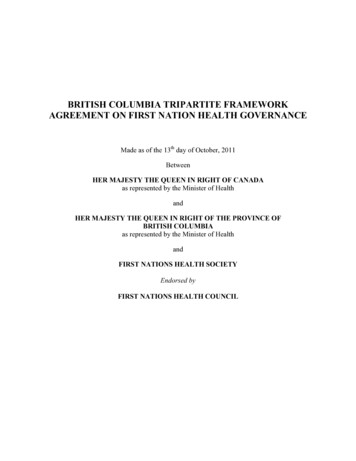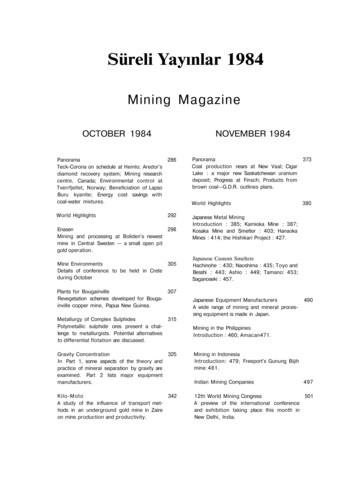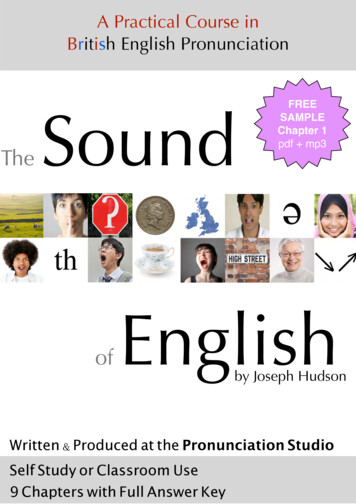
Transcription
A Practical Course inBritish English PronunciationTheSoundofFREESAMPLEChapter 1pdf mp3Englishby Joseph HudsonWritten & Produced at the Pronunciation StudioSelf Study or Classroom Use9 Chapters with Full Answer Key
Index1 Introduction2 How to use the book.3 IPA ChartChapter/Page14 - 15216 - 27328 - 39440 - 51552 - 63664 - 75776 - 87888 - 999SoundsSoundComparisonSpelling & Sound-9 ‘ghoti’ Introduction10 Schwa5-6 Consonants7-8 Vowels17-18 FricativeConsonants19-20 θ vs ð21-22 s Endings29-30 Long Vowels31-32 ɪ vs i:33-34 Silent r 41-42 PlosiveConsonants43-44 Glottal Stopvs /t/45-46 ed Endings53-54 Short Vowels55 /h/ Fricative65-66 ApproximantConsonants67 Weak ə vs ɪ68 Weak ɪ vs i77-80 DiphthongVowel Sounds89-90 NasalConsonants101-102 Affricate100 - 111 1ConsonantsIntroduction2 HowKeyto use the book.112 -130 Answer3 IPA Chart131-132 Glossary-56 h Function57-58 Silent Letters69-70 oo 81-82 o 91-92 ŋ vs ŋg93-94 a 103-104 Long vsShort Vowels105-106Contractions133 Acknowledgements & Further Reading134 About the Author, Voices & School
StructureIntonation11 Function / Content 13 Patterns12 Schwa Function14 UsagePostscript15 IPA23-24 Schwa Function 25-26 Sentence Stress27 HomographsWords& Tonic Syllable35-36 2 SyllableWords37-38 Wh- Questions39 Homophones47-48 3 SyllableWords49-50 Yes/NoQuestions51 Silent Syllables59-60 Joining61-62 Prominence62-63 Verb/NounStress71-72 Vowel Joining73-74 Question Tags75 ‘have’83-84 Compounds85-86 High-fall87 ‘do’95-96 Double StressCompounds97-98 Fall-rise99 ‘are’107-108 Stress Shift109-110 Adverbials111 Phrasal Verbs
How to Use the BookEvery chapter is split into the following sections:- Sounds: how to pronounce vowels and consonants.- Sound Comparison: focus on difficult sounds that are often confusing.- Spelling & Sound: how to turn written English into speech.- Structure: how English joins together and the weak/strong structure.- Intonation: the use of pitch and stress in speech.Most activities come with audio files to practise with. These are indicated with thefollowing symbol in the left margin: 9.3Every page of the course contains up to three parts: NOTES, EXERCISES andDRILLS as follows:NOTES All notes appear in grey boxes like this one. Here you will find the rules and production notes for each section.EXERCISES- Complete the exercises and check your answers with the audio or answer key.- The answer key is found in the back of the book on pages 113-130.DRILLS- Repeat drills regularly with the recording until they become easy to produce.- There is space on the recordings to repeat after each sentence or sound.EXTRA MATERIALS & CLASSES- Many of the exercises in ‘The Sound of English’ have extra practice activities availableto download from our website, visit: www.thesoundofenglish.org- You can also find information about where to study the course with qualified teacherson the website.
IPA ChartIPA is phonetic script, it show us the sounds to pronounce rather than spelling. The script is very useful for improving accuracy in pronunciation. You will learn each sound and its possible spellings on the course.
Chapter 1- ConsonantsSounds-freeVowels*Before beginning, download theaudio pack from www.thesoundofenglish.org// ' \W,,)/:t1fl "16Postscript IPA-PatternsIntonationUsagef .'ll't't'.-Function &StructureContent:.r\-Spelling & ‘ghoti’Sound Schwa /ˈ pɜ:sənli/Answer Key Pages 113-114Before beginning, download your audio pack www.pronunciationlondon.co.ukPronuncaition Studio Ltd 37 Gray's Inn Road WC1X 8PQ0207 4040777 All rights reserved Joseph Hudson 2012
Consonant Types SoundConsonant sounds are produced by blocking air as it leaves the mouth. This course shows you how to pronounce all 25 consonant sounds of English. Below is an example of each consonant sound - listen and read them.Type of SoundSoundExample 1Example high-tʃchosecatch(plosive followed by fricative)dʒjoystagenasalmmoodcalmnnowturn(air is released through the losive(complete block of air followedby explosion)fricative(constant flow of air “squeezed”through a block, sounds likefriction)affricateapproximant(vowel-like consonant, no fullblock of air ion Studio Ltd 37 Gray's Inn Road WC1X 8PQ0207 4040777 All rights reserved Joseph Hudson 2012
Consonant Articulation SoundWe use the articulators: tongue, lips, & teeth, to block air. The places where we block air in English are shown below. alveolar ridgevelumlipsteethpalatetongueglottisEXERCISE- Listen to the recording and match the sounds in the boxes with their articulationdiagrams (the first one has been done). The arrows point to the place of /bh/ʔ6.- Check your answers in the answer key on page 112.www.pronunciationlondon.co.ukPronuncaition Studio Ltd 37 Gray's Inn Road WC1X 8PQ0207 4040777 All rights reserved Joseph Hudson 2012
TheSound EnglishofBook 3CDs - order your copy for 20.00Free UK Delivery & 30 Day Money Back GuaranteeOrder your copy now: http://pronunciationlondon.co.uk/book-3cds/“'The Sound of English' is a unique method whose simplicity will help you, first to unlearn all theaccumulative pronunciation mistakes acquired in the process of learning English as a foreign languageand then teach you - in an easy and practical way - all the tricks you need to know in order to sound likea native speaker. Highly recommended to all of those who want get their command of the Englishlanguage to another dimension.” Javier Pena, Spanish Voice Artist 2013"'The Sound of English' really encapsulates Joe and the Studio’s teaching in the last 6 years. It iseven better structured than the first one ('An English Accent') and although it is more compact insize, it seems to have packed in drills that I did not have the chance to do in class previously."Kay Ng, Cantonese Speaker, 2013www.pronunciationlondon.co.ukPronuncaition Studio Ltd 37 Gray's Inn Road WC1X 8PQ0207 4040777 All rights reserved Joseph Hudson 2012
Vowels Sounds A neutral English accent has 19 vowel sounds.There are 3 types of English vowel sound - short, long and diphthong.English spelling does not always show us which sound to pronounce.We will learn how to pronounce each individual vowel sound on this course.Type of Sound1.3short(single mouthposition)SoundSpellingsExamplesəa,1 e, o, ualive, the, today, supplyɪithin, sit, richʊu, oo, ouput, look, shouldee, ea, iewent, bread, friendʌu, ofun, love, moneyælong(single mouthposition)diphthong(double mouthposition)2 acat, hand, fanɒo, arob, top, watchi:ee, eaneed, beat, teamu:ew, oo, o efew, boot, loseɜ:ir, ur, worthird, turn, worseɔ:al, aw, or, our, oortalk, law, portɑ:a, al, arglass, half, careɪay, ea, ae, aipay, great, maidɔɪoi, oynoise, toy, choiceaɪie, i e, i, yfine, like, mightəʊo, o e, oano, stone, roadaʊou, owround, how, brownɪəeer, earbeer, hear, steereəare, ere, ea, aicare, there, bearwww.pronunciationlondon.co.ukPronuncaition Studio Ltd 37 Gray's Inn Road WC1X 8PQ0207 4040777 All rights reserved Joseph Hudson 2012
Vowel Articulation SoundsA vowel sound is made by shaping the mouth as air flows out. Articulators used to shape the mouth are: tongue, lips and jaw. The chart below shows examples of mouth positions in closemidrelaxedmidbackroundedopeni: (keep)ɜ: (bird)ɒ (watch)DRILL- Repeat the following sentences. Notice your jaw opening each time.1.51. Keep this red bag. 2. Who took Paul’s watch?3. The bird runs fast.- Which sentence contains only rounded vowels?www.pronunciationlondon.co.ukPronuncaition Studio Ltd 37 Gray's Inn Road WC1X 8PQ0207 4040777 All rights reserved Joseph Hudson 2012
Introduction Spelling & Sound- English spelling does not always indicate pronunciation.- It was famously claimed that the word ‘fish’ could be spelt ‘ghoti’ because:-/ ' \W,,)/‘o’ in ‘women’ is pronounced /ɪ/f .'ll't't'.-‘gh’ in ‘enough‘ is pronounced /f/:.r\-1.6‘ti’ in ‘motion’ is pronounced /ʃ/so ‘ghoti’ could be pronounced /fɪʃ/!The ‘Spelling & Sound’ section shows you how to select sounds accurately byinterpreting spelling.l "16 The pronunciation of many English sounds can be predicted by their spelling.:t1f EXERCISE- Each group of words contains an identical spelling.- Circle the word that you think is pronounced differently from the others.1. gooseloose2. noserose3. playedauthor5. paidmaidbut7. none1.7losestopped4. father6. putchooselikedNorthernsaidhutdonegone8. footbookfood9. slownowcow10. wordwork11. watchwallwornwas- Listen and check your answers.www.pronunciationlondon.co.ukPronuncaition Studio Ltd 37 Gray's Inn Road WC1X 8PQ0207 4040777 All rights reserved Joseph Hudson 2012
Schwa Spelling & Sound- Match the words below with the IPA transcription on the right:IPA Transcriptionaroundˈ mænə6mannerˈ seɪləsailorˈ kæktəscactusəˈ raʊndfe?)x)/1.8Word- Which sound appears in every IPA transcription?1.9 The schwa sound /əә/ can be spelt as a , e , o and u .The schwa is the most common vowel sound in English. The schwa is weak - it can never be stressed. The production of the schwa is neutral: lips, jaw and tongue are relaxedEXERCISE- Every word in the box below contains one schwa sound.- Listen to the recording and underline the schwa in each word.1.10servantbaconpersistpicture commit alivejumper sublime London salad Peru structuresuggest soldier persuade combine balloonterror cushion scripture tighten sofa Russia- Think of any word in English with 3 syllables or more.- How many schwa sounds does it contain? Check in a dictionary.EXAMPLE: ‘conspiracy’ 2 schwa sounds.www.pronunciationlondon.co.ukPronuncaition Studio Ltd 37 Gray's Inn Road WC1X 8PQ0207 4040777 All rights reserved Joseph Hudson 2012
Function & Content Structure- Listen to the sentence below:“Shall we go for a walk?”1.11- Which words are stressed? Why? Spoken English is divided into function and content words. Function words carry only grammatical meaning, such as:Word Type Examplesprepositions to from for of with byauxiliaries are was do have could would shall canarticles a an thequantifiers some any few allpronouns he she it you I this that Content words carry real meaning such as:Word Type Examplesnouns car wedding James table joyverbs move drink turn enjoy thinkadjectives big interesting quiet slow brightadverbs quickly quietly fortunately often againEXERCISE- In the sentences below, underline the function words:1.121. Can we go for a swim in the sea?2. It’s a beautiful day in the South of England.3. How do you want to pay for this, sir?4. Jessica Smith is required in ‘Arrivals’ immediately.5. When you get to the station, give me a call.6. Would you like some of my carrot cake?www.pronunciationlondon.co.ukPronuncaition Studio Ltd 37 Gray's Inn Road WC1X 8PQ0207 4040777 All rights reserved Joseph Hudson 2012
TheSound Englishof140 Page E-book 200 mp3 Audio - 15.0030 Day Money Back GuaranteeOrder your copy now: http://pronunciationlondon.co.uk/e-book-audio/"I really like this book. Especially, the examples you use (like the ones on p77for diphthong vowels), very easy to visualize and remember. My congratulations onthis work." Daria, Polish Speaker & English Teacher, 2013"Studying pronunciation on this course book puts the student at ease and provides answersto the many questions a learner may have. Most importantly, the course book offers aremarkably solid structure to a notoriously difficult and changeable subject, i.e. the spokenword”. Arianna Willis, Italian Speaker, 2013"As I expected, very well written. I especially like the drills; very well-thought out. andamusing too. I'm listening to the CDs now. Excellent!" Steve Collins, Author, 2013www.pronunciationlondon.co.ukPronuncaition Studio Ltd 37 Gray's Inn Road WC1X 8PQ0207 4040777 All rights reserved Joseph Hudson 2012
Schwa Function Words Structure- Read and listen to the passage below, the schwa sound is written in IPA:I’d like təә go shopping fəәr əә pair əәf shoes, bəәt thəәshops əә closed becəәse thəәs əә weathəәr əәlert. əәparrəәntlylots əәf snow is coming in frəәm thəә Highləәnds so thəәgovəәrnməәnt həәv əәdvised peopəәl təә stay əәt home.1.13- Which function words are pronounced with a schwa sound in the passage? Many function words are pronounced with schwa when they are weak.If a function word is stressed, it can not be pronounced with schwa.Function words are always strong when said alone.DRILL- Say the word on the left alone (strong), then say it in the sentence on the right usingthe schwa sound (weak):Word Sentence(STRONG) (WEAK)1.141to /tu:/ I went to work early. /tə/2are /ɑ:/ What are you doing? /ə/3was /wɒz/ Was it warm in Greece? /wəz/4from /frɒm/ This cardʼs from my family. /frəm/5there /ðeə/ There werenʼt enough drinks. /ðə/6can /kæn/ Where can we buy a map? /kən/7her /hɜ:/ Her carʼs broken down. /hə/8for /fɔ:/ Iʼll repeat for the last time! /fə/www.pronunciationlondon.co.ukPronuncaition Studio Ltd 37 Gray's Inn Road WC1X 8PQ0207 4040777 All rights reserved Joseph Hudson 2012
Introduction Intonation- Listen to the following question being answered in three different ways:1.15A Johnny, have you finishedyour homework?1. YesB 2. Yes3. Yes- Which answer (B) means i) maybe ii) definitely iii) why are you asking me? Spoken English uses 3 intonation patterns - fall, fall-rise & rise. Intonation shows us the speaker’s attitude to what they are saying.DRILL- Repeat after the recording:1.161. a) Yes b) Yes c) Yes2. a) No b) No c) NoEXERCISE- Listen to the conversations and circle the answer you hear:1.171. Are you married?Yes 2. Did you enjoy the film?Yes 3. Can you afford this meal?Yes 4. You’re drunk, aren’t you?No 5. Is this your first class?No 6. Did you eat all the chocolate? No www.pronunciationlondon.co.ukPronuncaition Studio Ltd 37 Gray's Inn Road WC1X 8PQ0207 4040777 All rights reserved Joseph Hudson 2012
Usage IntonationIntonation shows us a speakers’ attitude to their words. This course will show you how to produce English intonation in your speech. Some important examples of intonation usage are displayed below.EXERCISE1. ATTITUDE- Listen to the following conversation twice:1.18A “Dad, I’ve got some news, I’m getting married!”B “Excellent”i) How is the father’s reaction different in each case?ii) How does he show this with intonation?2. IMPLICATION- Listen to the following conversation twice:1.19A “What did you think of the film?”B “It was good.”i) What is the difference in meaning between the two versions?ii) How is the intonation in the word ‘good’ different the second time?3. REPETITIONListen to the following conversation:1.20A “Who are you meeting tonight?”A “Who are you meeting tonight?”B “Nicole Kidman”.”B “Not the Nicole Kidman!”- Person A says the same question twice, but the intonation is different the second time.How does it change and why?www.pronunciationlondon.co.ukPronuncaition Studio Ltd 37 Gray's Inn Road WC1X 8PQ0207 4040777 All rights reserved Joseph Hudson 2012
IPA Postscript- Look at the dictionary entry for the word “personally”:personally /ˈ pɜ:sənli/- What differences do you notice between the spelt and the IPA versions?IPA (International Phonetic Alphabet) shows the way we pronounce words. In English, the pronunciation of a word often differs from its spelling, making IPA avery useful study tool to improve your pronunciation. Stress is marked in IPA using the following symbol / ˈ/ EXERCISEi) Write the words from the box below into the chart next to their IPA transcription.ii) Write the silent consonant from each word into the 3rd column.cupboard island half often write know light lamb handbag autumn1.21WordIPASilent әn10ˈhænbæg- Listen to the recording to check your answers and practise saying the words.www.pronunciationlondon.co.ukPronuncaition Studio Ltd 37 Gray's Inn Road WC1X 8PQ0207 4040777 All rights reserved Joseph Hudson 2012
TheSound EnglishofCourses @ Pronunciation Studio LondonGroup Accent Reduction CoursesEvening & weekend group courses covering thesounds, structures and intonation of BritishEnglish. 8 week courses 250.Maximum group size - 8 (average 5).Individual CoursesAvailable every day between 09:00-21:00 inCentral London. Start with an assessment classto discover your errors.60 minute Assessment: 50 (including book)10 hour Course: 50020 hour Course: 950Intensive Courses in LondonStudy in a group or individually over 2 to 10 daysin London. Ideal if you are visiting the city.Weekend Group Intensive: 150Week Group Intensive: 300Individual Intensive: from 275Individual Classes via SkypeStudy one to one with our expert teachers viaSkype video call. Classes take place Monday toSaturday 09:00-21:00.Assessment Class: 40 (E-book Included)5 hour Course: 18010 hour Course: 340www.pronunciationlondon.co.ukPronuncaition Studio Ltd 37 Gray's Inn Road WC1X 8PQ0207 4040777 All rights reserved Joseph Hudson 2012
Answer KeyChapterPages1113 - 1142115 - 1163117 - 1184119 - 1205121 - 1226123 - 1247125 - 1268127 - 1289129 - 130www.pronunciationlondon.co.ukPronuncaition Studio Ltd 37 Gray's Inn Road WC1X 8PQ0207 4040777 All rights reserved Joseph Hudson 2012
Answer Key Chapter 1Consonant Articulation SoundsEXERCISE1. f/v 2. t/d/l/n3. m/p/b4. k/g/ŋ5. θ/ð6. h/ʔEXERCISE- sentence 2 ʻWho took Paulʼs watchʼ uses only rounded vowels.Introduction Spelling & SoundEXERCISE1. choose 2. lose 3. played10. worn 11. wall4. author5. said6. put7. gone8. food9. slowSchwa Spelling & Sound- around /əˈraʊnd/, manner /ˈmænə/, sailor /ˈseɪlə/, cactus /ˈkæktəs/- /ə/ appears in every IPA transcription (in bold above).EXERCISEservant persist bacon picture commit alivejumper sublime London salad Peru structuresuggest soldier persuade combine balloonterror cushion scripture tighten sofa RussiaFunction & Content Structure- ʻgoʼ and ʻwalkʼ are stressed because they carry meaning.- The other words ʻshallʼ, ʻweʼ, ʻforʼ, & ʻaʼ are all grammatical words used to gel thesentence.EXERCISE1. Can we go for a swim in the sea?2. Itʼs a beautiful day in the South of England.3. How do you want to pay for this sir?4. Jessica Smith is required in ʻArrivalsʼ immediately.5. When you get to the station, give me a call.6. Would you like some of my carrot cake?Schwa Function Words Structure- Function words pronounced with schwa in the passage: ʻtoʼ, ʻforʼ, ʻaʼ, ʻofʼ, ʻbutʼ, ʻtheʼ, ʻareʼ,ʻthereʼ, ʻaʼ, ʻhaveʼ, ʻatʼ.www.pronunciationlondon.co.ukPronuncaition Studio Ltd 37 Gray's Inn Road WC1X 8PQ0207 4040777 All rights reserved Joseph Hudson 2012
Answer Key Chapter 1Introduction Intonation- i) ʻMaybeʼ yesii) ʻDefinitelyʼ yesEXERCISE1. 2. 4. 3. 5. iii) ʻWhy are you asking?ʼ yes.6. Usage IntonationEXERCISE1. ATTITUDEi) In the first version, the father is excited and interested, in the second he is uninterestedand a little rude.ii) The fatherʼs intonation is falling in both examples, the main difference is that he startsfrom a much higher pitch in the first example. This shows more emotion. In the secondversion, he starts his phrase quite low, showing disinterest.2. IMPLICATIONi) In the first version, we understand that person B really felt the film was good. In thesecond version, he is not entirely sure, he is showing reservation, we are expecting him tosay something less positive now.ii) In the first version, person B uses falling intonation on ʻit was goodʼ, whereas in thesecond version he uses fall-rising intonation, known as an implicational fall-rise.3. REPETITION- The first question is asking for new information, person A does not know the answer anduses falling intonation. The second time she asks, she already knows the answer, she isrepeating the question and for this reason uses rising intonation.IPA Postscript- The IPA version shows us a silent r , a long vowel /:/ and a silent a . It alsoindicates the pronunciation of the vowels /ə/ and nownəʊk (and w)5islandaɪlənds6lightlaɪtgh7cupboardˈkʌbədp (and ronunciationlondon.co.ukPronuncaition Studio Ltd 37 Gray's Inn Road WC1X 8PQ0207 4040777 All rights reserved Joseph Hudson 2012
THE AUTHORJoseph Hudson (BA/CELTA/IPA Cert) is a teacher and writerbased in London. He founded the Pronunciation Studio Speechschool in 2007. His early career was as a general Englishteacher, where he learnt the rudiments of language learning.He is the author of the courses ‘An English Accent’ and ‘TheSound of English’.THE RECORDINGSThe audio pack features the voice of Erica Buist (BA/CELTA/IPACert) alongside the author. Erica is an experienced and vibrantclassroom teacher. She has taught general English andpronunciation in Central America and England and joined thePronunciation Studio in 2009. Her voice skills are notablyclear and warm.THE SCHOOLPronunciation Studio London provides education in all aspectsof speech from phonetics, pronunciation and accent reductionto voice coaching and acting classes. Over 10,000 studentshave passed through its doors since 2007. Creative teaching,exciting materials, a passion for language learning in generaland phonetics in particular are central to its popularity.Visit the Pronunciation Studio at don.co.ukPronuncaition Studio Ltd 37 Gray's Inn Road WC1X 8PQ0207 4040777 All rights reserved Joseph Hudson 2012
www.pronunciationlondon.co.ukPronuncaition Studio Ltd 37 Gray's Inn Road WC1X 8PQ0207 4040777 All rights reserved Joseph Hudson 2012
A neutral English accent has 19 vowel sounds. There are 3 types of English vowel sound - short, long and diphthong. English spelling does not always show us which sound to pronounce. We will learn how to pronounce each individual vowel sound on this course. 1 2 Vowels Sounds Type of Sound
